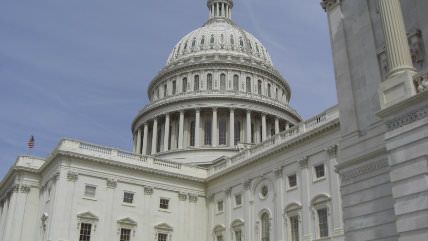Don't Look Now But Washington D.C. May Actually Reform Civil Asset Forfeiture

Washington D.C. city council members are considering a bill that would give D.C. residents the strongest protections against the abuse of civil asset forfeiture in the country. Currently, the Metropolitan Police Department (MPD) seizes millions of dollars of property from thousands of people each year—and keeps 100 percent of the profits.
Unlike with criminal forfeiture, where the government seizes assets after convicting someone of a crime, with civil forfeiture there is no legal requirement to prove a crime was committed or even to file criminal charges. Instead, once police confiscate property, the burden is on the owner to prove innocence. Property owners who can't afford a legal battle or whose property is worth less than court costs often simply relinquish their property by default.
In 1981, when D.C. enacted its civil forfeiture program, officials said they had given police a tool to take down drug lords and other high-profile criminals. Instead, MPD frequently, if not exclusively, uses civil forfeiture to seize property from the poor—be they small-time offenders or completely innocent.
At a hearing last week, Councilman Tommy Wells acknowledged problems with the District's civil forfeiture regime, saying "it doesn't look fair." But any reform will have to survive opposition from law enforcement. D.C. Attorney General Irvin Nathan argued the bill "would unnecessarily create major new problems in the civil forfeiture system, rendering it effectively inoperable."
An inoperable civil forfeiture system would mean falling back on the criminal forfeiture system. Would it be the end of the world if the government actually had to produce enough evidence to charge someone with a crime before seizing their stuff? I submit that it would not.
But the bill doesn't get rid of civil forfeiture.
Instead, it imposes much-needed and frankly modest safeguards, shifting the burden of proof to the government and requiring all proceeds to be deposited in the city's general fund. Importantly, the bill also effectively prohibits MPD from turning their forfeiture cases over to the federal government—something local law enforcement agencies nationwide do regularly to evade state laws that provide more protection for property owners than federal forfeiture law does. If passed as is, the bill would make D.C. the first state ("state") to close that loophole.
According to U.S. Attorney Renata Cooper, who also testified at the hearing, the above changes "would result in a significant financial loss to MPD." Well, maybe. But there's nothing stopping the city council from allocating forfeiture revenues from the general fund to MPD. The bill merely eliminates the private slush fund MPD has been running. Right now, determining the scope of MPD's forfeiture activities is an exercise in educated guesswork. In response to numerous Freedom of Information Act requests, MPD has released only incomplete and conflicting data on its forfeiture revenue and how it is spent.
To undermine substantive reforms, Attorney General Nathan unveiled an alternate bill at the hearing that retains some important procedural reforms from the original bill (like eliminating a fee MPD charges vehicle owners just to get a hearing in front of a judge). But the alternate bill leaves the status quo—secrecy, MPD's profit incentive, and the legal burdens on property owners—intact.
Demonstrably, where the law makes it easy and profitable for police to pursue forfeiture, law enforcement priorities shift from combating crime to fundraising. According to Darpana Sheth, an attorney at the Institute for Justice, a public interest law firm that litigates civil forfeitures, police "should not be placed in the difficult position of having to choose between securing revenue for their department and chasing or stopping crime." Hear, hear.


Show Comments (31)